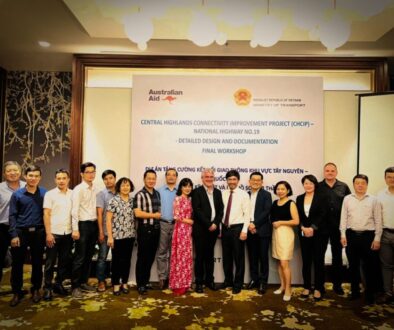Supporting Vietnam with its economic recovery efforts: Aus4Transport gets two new road packages ready for construction
IN BRIEF
Aus4Transport finished the year 2020 on a high, as 34 km of roads of the Detail Engineering Designs were approved for procurement. These soon-to-commence projects are split in three road sections between Quy Nhon and Pleiku, in Gia Lai province, and will assist the Government of Vietnam in its economic recovery efforts by creating jobs and boosting local economies, now and into the future.
The partnership between the Government of Vietnam, the Government of Australia and the World Bank in the Central Highlands Connectivity Improvement Project is contributing to the development of the Asian Highway system. Once finalised, the project will facilitate connection with neighbouring countries and strengthen the transport and logistics connectivity from the Central Highlands to the Central Coastal Provinces. Top priorities for this activity have been to ensure that National Highway 19 incorporates climate resilience measures and meets international traffic safety standards.
KNOW MORE…
The Government of Australia, through the Aus4Transport Program, is assisting the Ministry of Transport (MOT) in its goal to increase investment in Vietnam’s transport infrastructure sector. With this objective in mind, the Program has been supporting the Central Highlands Connectivity Improvement Project (CHCIP), partly funded by the World Bank, by assisting with the development of the engineering design, procurement documentation and the environmental and social planning.
The project is progressing successfully, as, in November 2020, MOT approved the Engineering Design for two priority packages, divided into three road sections, of CHCIP (34 km), meaning that these sections will soon be ready for construction. The packages were advertised for bidding by December 2020 and physical works are expected to start anytime at the beginning of the second quarter of 2021.
The Project strongly aligns with the Government’s objectives, policies and strategies. It will contribute to reducing poverty, boosting shared prosperity, allowing inclusive growth and environmental sustainability, as well as promoting equality and inclusion of marginalised groups.
As with many engineering services delivered over 2020, the activity has been heavily impacted by COVID-19, which created several challenges. These have been addressed in a collaborative and partnering approach by all stakeholders, including the MOT, local authorities, World Bank (WB), DFAT and the Aus4Transport team. The remaining non-priority packages are currently undergoing review by MOT and WB and are expected to be completed within the first Quarter of 2021.




